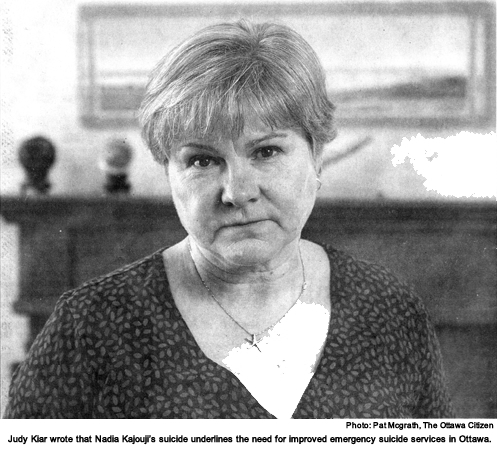We must do much more to help those who see suicide as option
Published:
Tags: 2009, letter, Ottawa Citizen
Sadly, Nadia Kajouji’s story underlines that as a society we are not doing enough to hold onto and help those who are feeling so lost and hopeless that death seems like their best option.
Those of us providing therapy and support to people struggling with mental health issues are all too often frustrated by the lack of appropriate next-step options for our suicidal clients.
Ottawa has a wide range of mental-health services at some of our city hospitals and with a few community agencies providing a 24-hour suicide hotline and a mental health crisis line.

It is all but impossible to find psychiatric care for someone in a crisis. Psychiatrists in this city have impossibly long waiting lists. There is no suicide prevention unit where patients are assured a bed and intensive therapy when they need it. Psychotherapists, social workers and family doctors are frequently the only support that they have.
Currently, many patients and their primary caregivers are greeted suspiciously at regular hospital emergency rooms, as though they are trying to take advantage of the health care system when they present themselves for help. I have had several clients say that they will never go through that process again because it was so demeaning to have to try to convince emergency room staff that they really were depressed, suicidal or unable to carry on.
My concern with our response to depression and suicidal ideation is that we don’t do enough to make a more healthy validating connection with people when they need it.
Imagine feeling at the lowest point in your life and then having to sit for hours in a crowded emergency room. You’ll have to go through triage, then see another nurse, maybe a resident doctor and then perhaps a staff psychiatrist and explain to all these strangers just how bad you feel.
I am concerned that once a patient has been identified at an ER they are all too often discharged, frequently alone and without follow-up. I’ve had several clients who have had this experience, which felt like the ultimate rejection.
The lucky few admitted or referred to outpatient services are usually not followed long-term because there is a shortage of psychiatrists, even just to manage their medications.
We’d do better with a dedicated psychiatric emergency department that has access to all the mental health services in our region. Its mandate should be that anyone who comes through its doors is taken seriously and will be followed, in some way, until they feel better. It’s time to face the reality that mental illness can happen to anyone, even beautiful and bright university students, and it should be treated as the life-threatening emergency it often is. We need to offer people a healthier option to what they are finding on Internet chat rooms.
Judy Kiar
Individual, couple and family therapist
